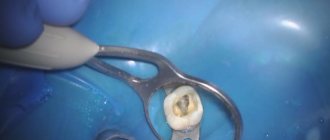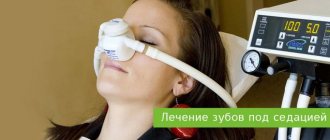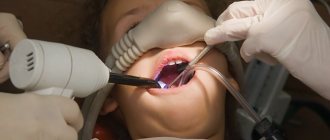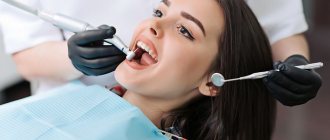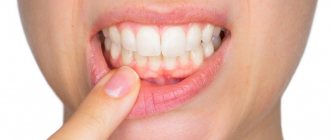The other day we received a question: “I turn white and pale when my tooth starts to hurt. I endure for a long time and yet, 2-3 days before going to the dentist, my heart jumps out of my chest! No matter how much you inspire, no matter how you convince yourself, nothing helps. Valerian and pepper are also powerless... I don’t know what to do, I urgently need to treat pulpitis and caries..."
Our dentists always answer questions from the Internet. But this time they did not immediately find what to answer. We sat in the resident’s room, drank tea, and the discussion resulted in this little note for patients.
The answer to this question is both simple and complex at the same time. But everyone must answer it themselves and overcome their fear. We are not psychologists, but we will try to help a little with this and give some practical advice.
What is this condition and when does it occur?
Dentophobia is the fear of dental treatment.
In such a case, the patient comes to the dentist only in acute situations when the tooth hurts badly. Most often, a child is afraid of the dentist if he has a negative experience with him or the child is simply afraid of doctors and reacts negatively to a white coat. This kind of fear occurs in many children, and it often lasts a lifetime. An adult visits the dentist only when there is severe pain. This condition occurs in a child for the following reasons:
- the child meets the dentist for the first time when he already has severe toothache;
- character traits in which the baby is shy and indecisive, afraid of any unfamiliar situation;
- he was forcibly held down during dental treatment; if adults rudely invaded his personal space, this causes a protest;
- parents do not explain to the child why they need to go to the dentist and have their teeth treated;
- all children react poorly to examination of the oral cavity by a doctor immediately, without prior preparation, this is unexpected for them;
- negativism arises when the baby was once deceived by adults, he was told that it would not hurt, but the procedure was painful.
Fear of doctors in a white coat occurs if the child has been seriously ill in the past. He transfers this experience to all doctors, and can never cease to be afraid of doctors of any specialty.
Content:
- Where does the fear of going to the dentist come from?
- The main mistakes of parents
- How to overcome dental phobia
- Contact the professionals!
Parents who care about their child’s health know how important it is to take their child to the dentist in a timely manner. However, many of them face the problem of fear of visiting the dentist's office. What is the reason that a child is afraid to have his teeth treated? And what should you do when it’s time to make another visit to the dentist? Let's try to figure this out.
Rules for examining and treating children at the dentist
In order for your child to stop being afraid of dental treatment, it is necessary to follow certain rules and act gradually.
Experienced dentists recommend:
- Parents should bring their daughter or son for preventive examinations. It is better to take them to the same specialist.
- The dentist should not immediately start with treatment; he needs to get to know the child.
- During the first examination, the doctor is not recommended to even wear gloves or pick up dental instruments, so as not to frighten the baby. You can give him a tour of the clinic and give him something.
- The doctor must establish contact with him and tell the baby what happened to his tooth.
- The dentist must explain to him in clear language what he is going to do now. The doctor must be able to persuade children.
- It is necessary to carry out only those manipulations that he agreed on with the baby.
- In good dental clinics they play cartoons or a children's film. The kid, captivated by the plot, is distracted from the procedure. At this time, the dentist does everything necessary to treat his teeth.
- If the baby asks his mother or grandmother to stay with him, he must be allowed to be present in the office. It will be easier to calm him down.
- A good help in developing a positive attitude towards dentists is the personal example of parents. The baby can be taken with you when adults go to the dentist. He realizes that this is a common thing and everyone takes care of their teeth.
- Sometimes it is possible to resort to treating the child under anesthesia. Before this, you need to make sure that the clinic can do it efficiently and there are opportunities to provide emergency assistance if something goes wrong. You must understand that children have age restrictions and this cannot always be done.
If the child understands that the doctor can be trusted, and the dentist does only what he promised, he will be less afraid and will begin to trust him. Next time the treatment will be smoother. The baby will develop a positive attitude towards dental procedures.
The main mistakes of parents or how to double children's fear
The first visit to the dentist, even for the most determined little one, is a step into the unknown. Boys and girls do not know what awaits them and how to behave.
However, very often the fear of dentists in children intensifies after the first visit to the doctor. And most often, the main cause of fear is not the drill at all, but the behavior of the parents. Let's look at the main mistakes that moms and dads make when going to the dentist with their baby.
- A child visits a dentist for a toothache
. Modern children are no less busy than adults: various clubs and sections, entertainment and travel. Often, parents do not find time to conduct a preventive examination, naively believing that pulpitis does not occur on baby teeth and caries on them does not need to be treated. As a result, the child goes to the doctor with acute pain and, of course, exhausted, is several times more afraid to have his teeth treated. - Parents motivate their children incorrectly
. Instead of explaining to the child that dental treatment is necessary for his health and there is no need to be afraid of treatment, mothers and fathers begin to encourage trips to the doctor with exclusively a variety of expensive gifts. Or, even worse, inventing fairy tales about the evil snake Gorynych, who will fly in and steal all the teeth. As a result, the child does not understand the importance of dental treatment and turns it either into a way of manipulating parents or into an unreasonable fear. - Parents forcefully treat their child's teeth.
Instead of explaining that you need to sit quietly and endure a small injection, parents sit the baby in the doctor’s chair and hold him in it by force. Such physical impact, especially from the closest people, inspires real horror in the baby. - Moms and dads choose uncomfortable times to visit the doctor.
A trip to the dentist will become several times more painful for a child if you take him to the doctor instead of a nap, after training in the pool, or at night. Naturally, the child is twice as afraid to have his teeth treated, because he is weak and capricious. - Parents tell their children about their bad experiences.
Modern dentistry has made the process of dental treatment almost painless. - Parents deceive their child
. There is no need to tell the baby lies: mothers and fathers should prepare him for the visit, and not tell tales about how “a mosquito will bite and it won’t hurt at all.” Be honest, yes, the anesthesia will be painful, but then the treatment will take place without any discomfort.
What to do so that your child is not afraid of the doctor: advice from psychologists
Psychologists have developed several effective techniques that parents can use to help their child stop being afraid of dental treatment. Let's consider each method separately.
1. Playing doctor
Show a little imagination and ingenuity: come up with a fun game for your baby. Look around the nursery: choose your baby’s favorite cubs, hares, hedgehogs and other animals. Come up with a game scenario - for example, the bear cub had a toothache, and he went to the hedgehog doctor to treat them. The doctor was very polite, gave the patient an injection, healed a hole in the tooth and even gave the little bear toothpaste and a book on oral care.
A role-playing game in which the mother will be a dentist and the child will be a patient will work well. And then vice versa. By trying on different roles and participating in different games, the baby will subconsciously be less afraid of the doctor.
2. Reward for good behavior
No, the “I’ll buy you a Barbie doll if you don’t scream at the dentist” method won’t work. First, it is important to explain to your child that going to the dentist is necessary to maintain dental health. The child must clearly understand the purpose of the visit.
But to make the baby less afraid, after visiting the doctor, you can ask the doctor to give him a small gift. The child will be very pleased to receive a gift from the dentist himself.
A pleasant and, importantly, useful gift for a child after visiting the dentist will be ASEPTA KIDS toothpaste, intended for children 4-8 years old. This fluoride-free gel paste provides gentle protection of teeth from caries and gums from inflammation. And the bright taste of “tutti-frutti” will turn the procedure of brushing your teeth into a pleasant sweet adventure.
3. Own example
By personal example, a parent can show their child that visiting the dentist is not a painful torture at all. Try going to the doctor with your baby. Let your child watch the dentist examine and treat your teeth. However, remember: your attitude at the doctor should be cheerful and positive.
And, by the way, so that the child is not afraid to have his teeth treated, you should never scold dentists in his presence. Maintain a bright image of a doctor, no matter what specialist you turn to in the future.
Let's give an example. One mother took a long time to treat her teeth. But every time she went to the doctor, she happily told her daughter about it. And after the visit to the doctor, she boasted to the baby that now there was no hole in the tooth and it would not hurt. And what do you think? Six months later, my daughter herself asked to see the dentist for an examination!
4. Gradual adaptation
There are no two identical children in this world. There is no need to worry if the child refuses to make contact with the doctor at the first meeting and is terrified of dental treatment. And even more so, you should not persuade your child with phrases like “good guys don’t behave like that.” Most likely, with such phrases you will achieve loud hysteria.
Try to adapt your child to the new environment. Look at the dentist's office together, take a walk around it, let the sunbeams shine through your mirror. Then explain what each tool is used for. A few minutes of acquaintance are enough, and you can go home. It is very likely that the next time the dentist will not look so intimidating for the baby.
5. Favorite cartoons
The dentist’s manipulations will be less noticeable to the baby if the treatment is accompanied by favorite cartoons. Ask your doctor to turn on the recording or allow you to stream cartoons from your tablet.
6. Heroes
Every kid has a favorite character - a movie or cartoon hero. So that a child is not afraid to have his teeth treated, his idol can be used as an example. Agree, it’s hard to believe that Batman or Superman are scared by the sight of a drill. Come up with a story about how the characters in childhood were also afraid to go to the doctor, but overcame their fear and went to get their teeth treated.
How to behave in an emergency
If your child suddenly gets a toothache, act quickly. In this case you can:
- Tell your child a story about a bad tooth that the doctor will cure and it will no longer bother you.
- Without having a serious conversation with your child. Explain how important it is to treat teeth on time and how modern medicine can help quickly relieve discomfort.
You shouldn’t lie to your child that treating pulpitis won’t hurt. It’s better to honestly tell everything about the upcoming procedure and be sure to emphasize that after anesthesia, the pain will immediately subside and the teeth will become healthy.
How to behave in a doctor's office
We hope that our recommendations for combating dental phobia in children will be useful, and the child will calmly withstand all dental tests. In conclusion, I would like to add some useful tips for parents on how to behave with their child in the doctor’s office:
- Don't shame your child.
Every person is afraid of something, regardless of gender and age. It is not the child’s fault that he got such a phobia. - Visit your dentist regularly.
Even if you yourself constantly examine your baby’s teeth, do not be lazy to take him to the doctor every six months. Believe me, from an early age a child should understand the importance of dental health. - Do not use physical force.
If a child throws a tantrum in the dentist's chair and runs away from the office, under no circumstances should you twist his arms and force him to sit back under the lamp. Leave immediately. Do the treatment next time. - Choose your dentist carefully
. Remember, the first doctor will form an impression on the child for life. If the child does not make contact with the doctor, try to look for another specialist - ask acquaintances, friends, ask in the kindergarten, maybe the teachers know a good dentist. - Distract your child.
There is no need to prepare your little one to go to the dentist a month before the appointment. Tell your child that you are going to the doctor 1-2 days before the visit. The longer the child “mentally prepares” to visit the doctor, the greater the likelihood that he will “cheat” himself and be afraid to have his teeth treated. - If necessary, sit next to the baby
. If you are sure that your presence in the office next to your child will help him overcome his fear, feel free to insist on this. Most dentists are okay with parents holding their child's hand. - Do not be afraid.
Remember, the child feels everything. If the thought of the dentist makes your knees shake, it's best to leave your baby's dental care to another parent or grandparent. - Don't try to treat all your teeth at once
. Remember, it is difficult for a child to sit still even for half an hour. If it so happens that several teeth are affected by caries, it is better to fill them gradually. - Make an appointment at a time that is convenient and convenient for your child
. It is best to go to the dentist in the morning or in the morning. The later the visit is, the more the child will “wind up” himself and will be afraid to have his teeth treated. - Let your child talk
. Once treatment is over, give your child time to vent, cry, laugh, and talk about treatment.
And one last piece of advice: praise your child.
Be sure to tell your child good, kind, encouraging words. Praise your baby for every courageous act, brag about his courage to his grandparents. Believe me, children appreciate it.
How to form a positive attitude towards treatment in a child
In order not to provoke a negative attitude towards dental procedures and the child begins to have a positive attitude towards treatment, you can take the advice of psychologists.
They give the following advice:
- visit the dentist regularly for preventive examinations, and not just when a tooth hurts, this makes it easier to form a positive attitude in your child towards dental treatment;
- plan a visit to the dentist in the morning, he will be calmer and more relaxed during the appointment, he will have less opportunity to think about the upcoming treatment and worry;
- during the trip, the doctor does not need to discuss upcoming manipulations with the baby; it is better to talk with him about abstract topics;
- carefully choose your attending physician; he should have extensive experience in treating young patients;
- do not show your excitement to the child, he will feel it and also become worried;
- after treatment, you need to praise the baby, say that his teeth will be healthy and strong;
- if there is a need to discuss the procedure, this must be done and the child will speak out;
- play dentist with your baby, treat your teeth with toys;
- watch a cartoon about Aibolit with him and discuss how important it is to treat your teeth on time;
- Do not discuss the treatment of your teeth in front of your child; he must not hear from his parents how painful it is to fill them, pull them out and drill them;
- Do not frighten children with bad behavior with visits to the dentist;
- In case of whims and bad behavior at a doctor’s appointment, there is no need to scold or punish the baby.
These tips will help you overcome your fear of dental procedures.
Contact the professionals!
The Dr. Keller clinic employs pediatric dentists who can find an approach to your child. They will provide comfortable reception conditions, tell the baby how important it is to take care of oral hygiene, and will be able to become the child’s true friends who can be trusted. They will prove that you can treat teeth without fear and pain. After all, their task is a healthy smile for every child who comes to the dental office. Dr. Keller makes dental treatment fun. And you need to tell your baby about this. So, if you haven't visited the dentist's office yet, now is the time to make an appointment!
What to do if a teenager is afraid to go to the dentist
A teenager trusts adults less, it is impossible to distract him and it is difficult to convince him of anything. You need to establish a trusting relationship with him and show respect for his choice.
It is advisable to follow these tips:
- Be sure to condemn all the procedures that have to be done so that he is not frightened by the unknown. Most fears go away after a detailed discussion of the upcoming situation.
- If a guy or girl refuses treatment and the situation is not urgent, do not insist on visiting a specialist. Familiarize them with the consequences of their refusal in detail and allow them to make a choice. After discussion, the teenager shows interest in treatment himself.
- Create positive motivation in your teenager for dental treatment and careful oral care. Explain to him the importance of healthy teeth and a beautiful smile for his future.
- Until the age of fifteen, you can always be in the dentist's office with your son or daughter and support him. If they are older, then the presence of parents is possible only with their consent.
- Choose a doctor who can establish good contact with the teenager. He must take into account the teenager’s opinion and communicate with him as an adult, and not just listen to the parents’ opinions and fulfill their wishes.
If you cannot cope with the situation on your own and the child continues to be afraid of the dentist, you should contact a psychologist. He will provide him with professional help and help him cope with fear.
Literature
- Boyko V.V. Recognizing and overcoming fear at a dental appointment // Institute of Dentistry, 2002. – No. 1, 4. – P. 15-23.
- Vinogradova T.F., Snagina N.T. Guide to pediatric dentistry // Medicine, 1995. – pp. 75-83.
- Gashimov R.G., Arakelova M.N. Psychological characteristics of children with dental diseases // Dentistry, 1988. – pp. 58-60.
- Ivanov G.G., Ivanova M.A. Assessment of the psycho-emotional state of children // Childhood Dentistry and Prevention, 2001. – No. 1. – P. 23-26.
- Lepelin A.V., Sutenkov D.Ya., Kazakova L.N. Psycho-emotional stress as the basis of dental phobia and the cause of the development of fear // Pediatric dentistry and prevention, 2004. - No. 3. – P.18-25
Dental treatment under general anesthesia
Patients often ask with great fear about the possibility of dental treatment under general anesthesia. But this technique has significant disadvantages:
- General anesthesia affects the entire body, loading the kidneys, liver, heart and blood vessels. Also, this procedure will require the presence of an experienced anesthesiologist who will select the right drug and calculate the dose. Not every clinic provides services of this kind.
- There is a high risk that your phobia will intensify after treatment under general anesthesia. This is also worth taking into account
Due to the high stress on the body, the use of general anesthesia for dental treatment is not recommended unless other, safer techniques have been tried.
How to get ready for effective treatment
Dentophobia does not only affect the patient. The dentist must also understand what to do with a patient who is terrified of the chair. Experienced doctor:
- Talk to a person;
- Find out the degree and specific cause of his fear;
- He will explain how the procedure will be carried out and what the result will be.
Modern dentists’ offices use methods that allow them to tune in to the upcoming treatment:
- A background of classical music and pleasant natural noises is created, promoting calm and relaxation;
- There are rooms where patients are offered video glasses to watch a movie.
If the available options for relieving stress fail, anesthesia is used. A psychotherapist can reduce severe dental phobia using special techniques.
How does dental phobia arise and develop?
If there is strong fear that interferes with normal dental treatment, it is necessary to determine its root cause. Any previous pain can develop into a strong phobia that is difficult to eradicate. The task of doctors is to help a person get rid of anxious thoughts and convince him that modern dental treatment is a safe and painless procedure. Today, dentists have at their disposal modern equipment and anesthetic agents that allow them to carry out any dental operations almost painlessly. If previously local anesthesia was used only for complex operations in the oral cavity, today even the treatment of minor caries is carried out with anesthesia. And more complex dental treatment is increasingly performed under general anesthesia. Most patients are unaware of this and are afraid of experiencing severe and prolonged pain again. It is this ignorance that fuels their phobia. To understand how to get rid of the fear of dentists, it is necessary to identify the causes of its occurrence. Most often, phobias have the following causes:
- ;
- Acquired dental phobia usually develops as a result of negative experiences with dental treatment. In addition, the cause may be hypochondria or other mental disorders.
- The congenital form of phobia often occurs as a result of genetic pathologies or intrauterine processes that affect the development of the fetus and the metabolism of serotonin and norepinephrine in adulthood. These hormones have a strong influence on sensitivity and pain threshold, as well as on the tendency to anxiety and groundless worries. Most often, the innate fear of the dentist is explained precisely by disturbances in the metabolism of serotonin and norepinephrine.
- Imaginary dental phobia develops after reading frightening stories in the media or after stories from friends who colorfully described and embellished their negative experience of visiting a dental office. A person’s general distrust of doctors can greatly influence the development of imaginary dental phobia. Sometimes such fear can develop even in childhood, when the child is constantly frightened by the doctor, generously telling him what horrors await him if he does not brush his teeth.
;
;
Regardless of the primary cause of dental phobia, a visit to the doctor cannot be delayed, since the fear will only intensify and the situation will worsen. Ideally, you should go to the dental clinic at the first sign of tooth decay. In this case, the treatment will be as effective, fast and comfortable as possible.
Psychological assistance for dental phobia
We bring to your attention some professional advice on how to overcome fear of dentists, from psychotherapists who regularly help patients solve this problem:
- ;
- You need to understand for yourself that dental health is the basis for the health of the whole body, so it is imperative to treat them. And the sooner help is provided, the faster and simpler the procedure will be.
- If the patient cannot overcome fear on his own, then you can always use the help of a psychotherapist or psychoanalyst.
- Confidence in the competence of doctors helps to significantly reduce fear. Therefore, you need to immediately choose a good clinic that uses modern equipment and anesthesia methods.
- It is advisable to create a trusting atmosphere, so you will know that the dentist is striving to make the treatment process as comfortable as possible for you. It’s good if this is a friend or family doctor whom you always visit.
- To understand how to overcome fear of the dentist, you need to find out what causes this fear. Most often this is a misconception about the treatment process. Just talk to your doctor and ask what technologies he will use to reduce pain.
- It is advisable that the clinic be free of odors of bleach, formaldehyde, other chemicals and medications. Often these odors become the cause of psychological discomfort.
;
;
;
;
;
